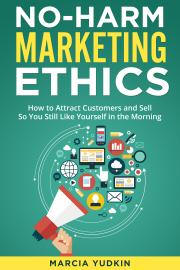Contrarian: 40 Business-Related Things I Do
My Own Way - Part Two
by Marcia Yudkin
For my 25th-year business
anniversary in 2006, I published
"Insights From 25
Years in Business." For my 30-year
anniversary, I posted "My
30 Favorite Business Books." Now that Iím
reaching 40 years in business, Iíve compiled a
list of 40 ways in which I part company with
received wisdom or common beliefs.
Catch up on Part One of
this essay, which discussed Mindset,
Productivity, Knowledge and Client
Relations, here.
Part Two
Marketing
21. "Follow what works." Many marketers feel
the fact that something tested better than
another option ends any argument about which
tactic is better. I disagree. Warren Buffett
expressed one issue with this perspective very
well: "It takes 20 years to build a reputation
and five minutes to ruin it."
An
option can at the same time bring in more money
and damage the publicís respect for the company.
In my book, that would be ample reason to choose
the less profitable path.
|
22. "Use social
proof." Psychologists have
established that being told a
restaurant, publication, service or
anything else is popular does indeed
pique interest from others.
Marketers therefore make heavy use
of numbers ("300,000 subscribers
canít be wrong!"), testimonials,
endorsements and so on.
However, smart
people realize that popularity
doesnít guarantee quality or
relevance, so if you market to smart
people or wish to be viewed as
smart, you might want to hold back
on using social proof. My
survey of introverts revealed
that some appeals to popularity even
backfire with that group. |
 |
23. "Share your struggles." Supposedly,
blogging or tweeting about your doubts, fears
and mistakes endears your followers to you.
Sure, they may like you more for that, and feel
youíre on their level. But it can have the
opposite effect on how they view your
competence. And this advice would not preserve
the zone of privacy thatís important to me. So
Iím not a fan of vulnerability follies.
24. "Marketing is a numbers game."
One of my
surveys of introverts sensitized me to this
issue. Quite a number of survey participants
volunteered the idea that they cared more about
quality connections with clients and others over
quantity of responses.
Looking only at numbers means you run the risk
of overlooking problems that affect rapport with
ideal customers and their loyalty or
satisfaction. It also ignores your own
contentedness with how your business runs.
25. "You must target prospectsí pain points."
Some marketing gurus drum this in obsessively:
Only if your product alleviates a pain people
feel can you succeed in the marketplace. But
thatís patently false. Most of my products donít
solve a problem. Rather, they help people
achieve a goal, hope or dream, such as obtaining
more traffic, mastering the art of copywriting
or enjoying passive income.
(If
you reply by redefining, say, someone wanting to
look beautiful as addressing a pain point, then
the original principle about pain points becomes
meaningless.)
26. "Without social media, forget success."
I have a website, a Twitter account and a few
videos on YouTube. No Facebook, no LinkedIn, no
Instagram, no blog. The urge to follow the
minutiae of other peopleís lives or keep friends
and strangers informed of my latest experiences
is foreign to me.
If
social media floats your sailboat, fine. But
donít pontificate that people are doomed to
poverty if they donít invest energy in social
media, because this hasnít ruined me.
|
 |
27. "You should manufacture
scarcity." We know that more
people respond when a deadline or
numerical cut-off point comes near.
I have clients who swear by the
tactic of keeping a waiting list for
a program that opens only twice a
year, though thereís no real reason
not to keep the door open all the
time. The Disney-esque tactic of
keeping products in the vault except
for limited times likewise motivates
people to buy right now.
These moves bother me, so Iíve never
gone there. As for flat-out falsely
telling people time or items are
running out when theyíre not, thatís
unquestionably wrong. More on that
in my ebook
No-harm Marketing Ethics.
|
28. "Guarantee their success." After
learning about the power of guarantees, I tried
one out in a coaching program - guaranteeing
that I would keep working with the client until
they earned back the cost of the program. What I
discovered, though, is that the guarantee
attracted people who were more fearful and less
apt to take personal responsibility than the
mentorees whom I usually worked with.
Consequently I later ditched the guarantee and
relied on pre-program screening to select
mentorees with attitudes that made them likely
to succeed.
29. "Follow the leader." According to this
orientation, if big names in marketing do
something, thatís necessarily a model worth
emulating. I once complained to a website that
posted names and home towns of people who had
just bought something there that this violated
customer privacy. They responded with a list of
prominent companies that used the same software
enabling them to do this.
"Please, you are not listening," I wrote back.
"I donít care how many companies do it - hereís
why itís wrong." I did get a more thoughtful
reply then, which was my goal in writing to them
in the first place.
30. "Do it my way." Countless marketers
teach only one route to success: what worked for
them. I feel this is lazy and short-sighted.
Accordingly, I normally describe multiple
options for achieving a goal.
For
instance, when youíre launching a service
business, you may not mind doing targeted cold
calls. But if youíd rather not approach
strangers, you can contact local media for
publicity, start a content-rich blog,
participate actively in LinkedIn or Facebook
groups, teach a class or send direct mail.
Communication
31. "Exaggeration is necessary." We talk
about this a lot in a language learning forum I
belong to, where we discuss the many programs
falsely (yet appealingly) claiming theyíll make
you "Fluent in three months!" Given the
unrealistic expectations of people whoíve never
learned a second language, could you sell
anything in that industry with a realistic
timeline?
One
forum member said, "All modern
media/sales/content/politics relies on
exaggeration." Yet time after time Iíve seen
unflashy, honest marketing achieve solid success
even though it may not end up creating a market
leader.
|
32. "Metaphors are harmless."
At a writerís workshop, I once held
up Jay Conrad Levinsonís book
Guerilla Marketing to make a
point. A woman in the audience put
up her hand, then offered, "I would
never buy that. Itís militaristic."
What? I thought, looking at
the camouflage-design cover in a new
light.
That incident forever sensitized me
to the pervasiveness of violent
metaphors in marketing, from "killer
this" and "killer that" to Perry
Marshallís guide to "Assassin-Grade
Google Ads." Desensitization to the
brutality of such language is not
good for any of us, and I call this
out whenever I can. |
 |
33. "Brag, brag, brag." Iím not shy about
celebrating my achievements, such as getting my
company featured on page 1 of the Wall Street
Journal. (I tell that story in my book 6
Steps to Free Publicity.) But as I discuss
in
No-Harm Marketing Ethics, I believe itís
wrong to stretch the truth and claim accolades
that you didnít fairly earn.
I
will not allow anyone to describe me as a
"bestselling author," because I never landed on
a major Best Sellers list. Many ebook authors
claim "bestselling author" distinction because
they engineered sales of a few dozen copies in
one day on Amazon while being well aware that
that label makes them sound more accomplished
than they are.
34. "Everyone knows that!" We all get
tripped up by whatís called "the curse of
knowledge": forgetting that others arenít
familiar with whatís obvious to us. Iíll never
forget my primary care doctor asking me, during
our get-to-know-you consultation, "What is
marketing?"
Again
and again I have argued with clients that they
are wrong to assume all their prospects
understand a certain concept. I always try my
best not to leave novices out in my marketing
writing, through unexplained jargon or cultural
allusions. A snobby attitude toward those not in
the know simply hurts you yourself.
Money
35. "Money is the measure of success."
Someone who makes more money than I do or who
has a bigger house or boat isnít therefore more
successful in my eyes. Do they genuinely serve
their customers and clients and help make the
world a better place in some way? Are they happy
and feel fulfilled by what theyíre doing? If
they encountered setbacks, could they quickly
regain their equilibrium? Do they have admirable
values besides earning big bucks?
|
 |
36. "Letís bargain." When
someoneís first contact with me
includes a suggestion that I lower
my posted rates, this sends up a red
flag for me. Theyíre signaling a
lack of respect for my expertise and
a set of priorities in which quality
isnít that important.
Clients who ask for lower fees often
turn out to be complainers - more
fussy and critical than those who
agree to pay what was asked. Saying
"I canít afford it" reveals their
priorities, not how much funds they
have at their disposal, something I
talk about at length in
Pricing for Entrepreneurs. |
37. "It takes money to make money." When I
recently heard someone say she spent $20,000 to
create her first online course, I gasped out
loud. I accomplished that goal spending $5. I
have always chosen to invest time and creative
energy rather than money in my projects, and
thatís worked extremely well for me.
38. "A bird in the hand is worth two in the
bush." Iíve seen numerous service providers
caught in a trap where they understand that
having products would provide a line of revenue
for future slow times yet they canít let go of
"money now" clients to make time to develop the
products.
In
contrast, the book royalty checks I received
year after year early in my career persuaded me
to always make time to put things in place that
would bring in money years later. Iím still
doing this even though financially I probably
donít need to. After all, the year 2020 proved
that a healthy world economy can go haywire at
any moment.
39. "Get paid what you deserve!" This
popular exhortation contains a thinking trap: No
one "deserves" a particular level of payment -
or any at all. After all, in the right
circumstances, weíll clean up, fix things,
provide feedback or share what we own with
others without payment.
Fees
are mutually decided upon between practitioner
and client. If you want to be paid more and need
to plump up your self-confidence to do so, fine.
But toss myths about deservingness into the
trash bin where they belong. More on this in
Pricing for Entrepreneurs.
40. "You canít make money doing that!" It
rankles me when experts with a substantial
following make blanket pronouncements about the
unprofitability of certain niches or topics.
Almost always, such generalizations just show
ignorance and prejudice.
For
instance, many say you canít make a living as a
marketing advisor for small businesses. Wrong!
My best clients have been high-earning
one-person or two-person businesses that want to
extend their success.
If you enjoyed reading
this two-part piece, would you do me the
favor of sending a like-minded friend or two
a link to this page, or posting about it on
social media? Thank you!
|







